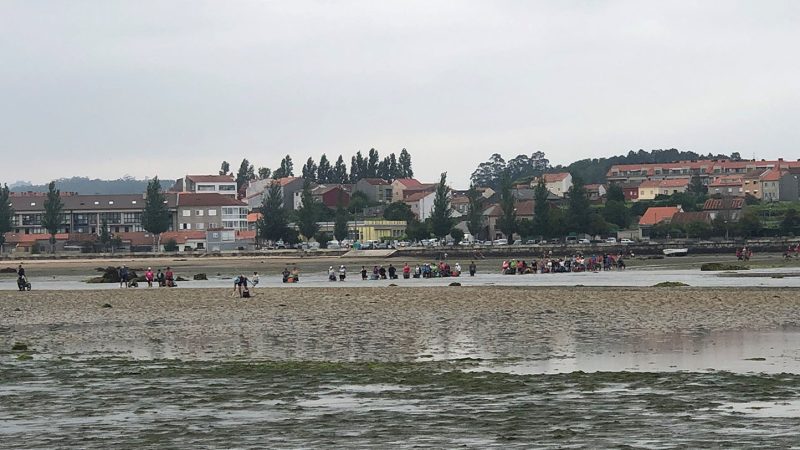Scientists from UVigo, USC and UDC delve in a publication in the seafood sector of the Rías Baixas. They evaluate socioeconomic vulnerability factors and adaptation strategies to the climate crisis.
Resilience and social adaptations to climate change impact in small-scale fisheries, is based on the results of the Marisco project, coordinated by the lecturer and researcher at the Marine Research Centre (CIM) of the University of Vigo, Elsa Vázquez, and funded by the State Programme for R+D+i Focused to the Challenges of Society of the Ministry of Science, Innovation and Universities.
The work helps, according to its authors, to fill, in part, the research gap on the socio-economic component of the threats that the effects of global change can generate in small-scale fisheries and the communities that live from them, both in Galicia and in other parts of the world that face similar challenges. Taking as an example three shellfishing areas relevant to production in Galicia (Cambados, Campelo-Poio and Redondela), in which interviews were conducted with around 250 shellfish gatherers (92% were women), the article provides, according to Villasante, “new empirical evidence on the social adaptation strategies developed by shellfish gatherers and their families in Galicia. Case studies, such as the ones presented here, are essential to build resilience and collective adaptation to contain the impacts of climate change”.
The impact of climate change on the Galician estuaries
On Europe’s Atlantic coast, the effects of climate change will manifest themselves, according to scientific estimates, in increasingly frequent and intense heat waves or extreme rainfall that have modified the salinity of the waters of the estuaries. This will cause, according to Celia Olabarria, professor and researcher at the CIM UVigo, effects that will lead to the loss of marine biodiversity and alteration of ecosystems. The Galician coast, especially the Rías Baixas, stands out for hosting one of the most important bivalve fisheries in Europe in terms of catches and employment, as well as for its great socio-economic relevance in the environment. Species such as the Palourde and Japanese clams, the Pullet Carpet shell or cockles are some of the most notable in this activity. However, the activity is exposed to important spatio-temporal variations in catches due to fluctuations in environmental conditions caused by changes in temperature or salinity.
According to studies carried out under the Marisco project, the effects of climate change may increase stress in these ecosystems and push the species to the limits of tolerance in factors such as reproduction and growth. This would lead to recruitment problems or delays in the time required to obtain commercial sizes, with a consequent decline in abundance of these species. In addition, rising sea levels could cause the siltation of some intertidal beds, and extreme summer heat waves will also affect the working conditions of shellfish gatherers.
In this context, the team analysed the capacity of fishing communities to adapt to global change scenarios, which are defined as adjustment processes that aim to moderate the damage or take advantage of the possible opportunities for benefit that arise in the face of these impacts. According to the authors, “understanding the factors involved in vulnerability and resilience, taking into account the social aspects for the sustainability of artisanal fisheries, would help the scientific community and policy makers to minimise the underlying causes of this social vulnerability in order to cope with socio-ecological crises and impacts”.
Less professional experience and lack of generational relevance are among the main risks
Among other results, the paper shows that less experience in the activity and less commitment to participation in shellfish groups tend to increase the risks of economic vulnerability, which puts on the table the need for corrective measures to address these issues. The article also warns that the sector is facing a lack of generational replacement to work in shellfishing to ensure not only profits, work and the presence of new people in coastal communities, but also to retain traditional knowledge and socio-ecological memory of associated practices, experience and cultural values.
This high vulnerability of less experienced people may deter newer people from joining the sector, so the study recommends that administrations should prioritise economic incentives towards the incorporation of new people in order to keep the sector alive and fix population in these coastal areas. In this way, the authors stress that failure to adapt to this new scenario “can affect the economic productivity of the sector and lead to overexploitation and loss of resources, with possibly serious consequences for families”.
Source: DUVI



